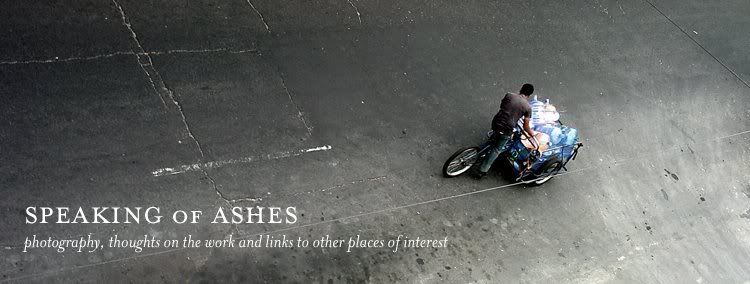There is a relationship between memory and freedom
 I used to tell people that I wouldn't read art theory, that literary theory and literary thinkers were always light-years ahead of people still fumbling around with this crap they call "concepts," and "conceptualism." I am not sure I feel much different about it now.
I used to tell people that I wouldn't read art theory, that literary theory and literary thinkers were always light-years ahead of people still fumbling around with this crap they call "concepts," and "conceptualism." I am not sure I feel much different about it now.
I've had OE (a literary blog) on my aggregator list for a long time cause they publish some relatively obscure Polish writers and such. Fun but not always relevant, really, to what I like to think about. There are probably too many writers' blogs to keep on top of, but I like to touch base with a few from time to time.
Jean Mackin's Essay about "What Fiction Asks Us To Remember" is just the sort of actual thinking that I try to encourage artists around me to do. It would probably get you laughed out of Yale's MFA program, but it is a lot more relevent to me than anything that has passed for thinking coming out of those lofty places.
"Perhaps historical fiction keeps our memories malleable by constantly recreating and adding to those memories; perhaps there is a connection between fiction, memory and freedom." Perhaps painting keeps our memories malleable. Perhaps there is a connection between painting and freedom... and memory?
[...] who’s to say that an artificial memory is less meaningful than mundane ones? De La Mettrie argues that memories become encoded in neurons and have physical properties, so why can’t the memories acquired in a reading of fiction matter as much as the memory of today’s first cup of coffee and who poured it for you? Read, and remember. Is it possible to also understand something from what is given us by the memories in fiction?I'd say yes. And it is a lot more interesting a question than I hear being posed by "concepts." Honestly, whatever that even is nowadays, I have so long ago lost interest, but it is nice to ponder that painting today deals in real truth. In possible valid truths that are otherwise un-reachable, painting is reaching for possibilities. Without going too rabid on conceptualism, I think that the thinking being done in those kinds of conversations is simply not doing that. I think at times I get perceived as being some sort of history fanatic. Maybe that is not far from the truth, but I am not sure what else to call the subject matter of what we are and where we came from and who are we today, but history. And history, as a literary art, has an advantage that art-making, art practice, art thinking maybe doesn't anymore. We used to be able to say that history was based in "fact," and that those writing history had a tremendous power. I wonder if we've ceded that power. Certainly in Fine Arts, that power is long gone.


No comments:
Post a Comment